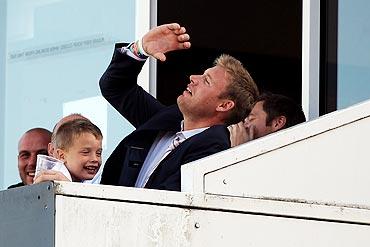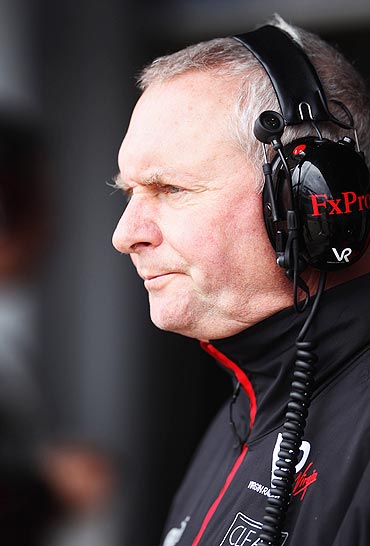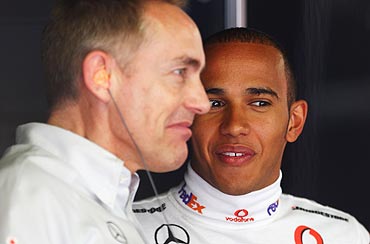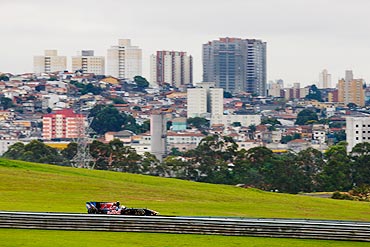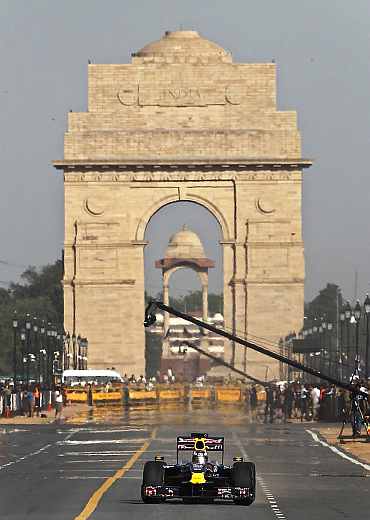 | « Back to article | Print this article |
Bootled beer and street curry, Flintoff's advice for F1 teams
Andrew Flintoff's advice to Formula One teams visiting India for the country's first Grand Prix next week is to fuel themselves on beer and curry.
Virgin Racing team boss John Booth bumped into the colourful ex-England, Lancashire and Chennai Super Kings cricketer at Silverstone in July and picked his brains about health and safety.
"I knew he'd been to the Subcontinent on a number of occasions and he said he'd never ever had a problem, just eat lots of curry and drink lots of beer," Yorkshireman Booth told Reuters at last weekend's Korean Grand Prix.
"Bottled beer and street curry. Sounds like a perfect recipe for me. That's like an Englishman's dream, isn't it?."
Security, main issue on teams' mind
Behind the light-hearted banter, and unsurprising advice from a man whose passion for beer and curry was well-documented as a player, there are some serious issues to be addressed as teams venture into what is, for most in the globetrotting glamour sport, unknown territory.
What the drivers and mechanics eat, how they get safely to and from the circuit and general security measures in a country always on alert for terror attacks must all be considered.
"On a personal level you wouldn't even think about it but when you're responsible for 70 people then suddenly it's a whole new level," said Booth.
Team's fear from 'Delhi belly'
Rumours that some teams were bringing all their food with them from Europe, or flying in reserve staff as backup in case of an outbreak of 'Delhi Belly', appear wide of the mark.
"I think the only reason people would take their own food is to guard against the hyped cost of food when you get there," said Booth, citing some of the charges listed by official providers.
Security is another matter, and there the cricket connection again comes into play.
"I believe the people who give security to the England cricket team have given some advice to Mercedes and ourselves and maybe some other teams as well," McLaren team principal Martin Whitmarsh told Reuters.
'Teams have to be respectful to India'
He and the others were reluctant to give details.
"What we don't want to do is make the story, frankly, that we are all worried about going to India. We've got to be respectful," said Whitmarsh.
"India is our host and for us to denigrate or suggest that we've got extra concerns (would be wrong). We have them wherever. Nowadays any modern company has a big duty of care to all of its staff and we've got to look after them."
The teams are no strangers to special measures, hiring security guards in Brazil where even drivers have been held up by armed robbers at traffic lights and where luxury hotels are never far from teeming slums and sewers.
'Most of the worries are due to unfamiliarity'
There is also Bahrain, whose Grand Prix remains on the calendar for next season despite this year's violent unrest.
"Terrorism can happen anywhere, it can happen on a tube in London or anywhere. So we have got to be aware of that," said Whitmarsh, whose team have their own doctor. "We've tried to take some precautions, we've sought some advice.
"The staff will be chaperoned ... and the drivers, myself and every member of the team and catering are all staying in the same hotel. That's because we don't know the scene so well.
"That's an unusual thing to do but we're doing that to try and make sure we can then get people to travel together and manage the situation," said the McLaren boss.
Sauber's Dehradun-born Chief Executive Monisha Kaltenborn suggested most of the worries were down to unfamiliarity.
"You look at what happens in Brazil which can be dangerous to your life, when people come and point a gun at you. And that's not made such a big issue of," she told Reuters.
"Half the people haven't been to India and they just hear something and then they panic over it."

© Copyright 2025 Reuters Limited. All rights reserved. Republication or redistribution of Reuters content, including by framing or similar means, is expressly prohibited without the prior written consent of Reuters. Reuters shall not be liable for any errors or delays in the content, or for any actions taken in reliance thereon.
